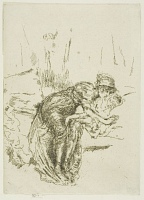Cameo, No. 2 | ||
| Number: | 460 | |
| Date: | 1891 | |
| Medium: | etching | |
| Size: | 178 x 128 mm | |
| Signed: | butterfly at upper left | |
| Inscribed: | no | |
| Set/Publication: | no | |
| No. of States: | 1 | |
| Known impressions: | 5 | |
| Catalogues: | K.348; M.334 | |
| Impressions taken from this plate (5) | ||
KEYWORD
baby, costume, dress, model, mother, tanagra, touched proof, woman seated.
TITLE
Minor variations on the title and punctuation are as follows:
'Cameo No. 2' (1900, Whistler). 1
'Cameo, No. 2' (1896, Wunderlich's). 2
'Mother and Child, No. 2 – Cameo' (1900, Caxton Club). 3
'Cameo No. 2' (1902, Edward Guthrie Kennedy (1849-1932)). 4
'Mother and Child. Cameo Number two' (1904, Boston). 5
'Cameo, No. 2' (1909, Howard Mansfield (1849-1938)). 6
'Cameo, No. 2' is the preferred title. The related etching is Cameo, No. 1 (Mother and Child) [459]. The figures are probably a young woman and her niece so that the title 'Mother and Child' is not appropriate.
'Cameo No. 2' (1900, Whistler). 1
'Cameo, No. 2' (1896, Wunderlich's). 2
'Mother and Child, No. 2 – Cameo' (1900, Caxton Club). 3
'Cameo No. 2' (1902, Edward Guthrie Kennedy (1849-1932)). 4
'Mother and Child. Cameo Number two' (1904, Boston). 5
'Cameo, No. 2' (1909, Howard Mansfield (1849-1938)). 6
'Cameo, No. 2' is the preferred title. The related etching is Cameo, No. 1 (Mother and Child) [459]. The figures are probably a young woman and her niece so that the title 'Mother and Child' is not appropriate.
1: Whistler to E. G. Kennedy, [12/15 February 1900], GUW #09799.
2: New York 1898 (cat. no. 289).
3: Chicago 1900 (cat. no. E236a).
4: Kennedy 1902 (cat. no. 311).
5: Boston 1904 (cat. no. 168).
6: Mansfield 1909 (cat. no. 334).
DESCRIPTION
A young woman sits on a bed, bending forward to right, with her right arm over a sleeping baby, her head lying on the pillow close behind the baby's head. The woman is wearing a thin robe fastened along her shoulders and upper arm, and gathered in around her waist and under her breast; she has a scarf bound about her head, with dark curly hair escaping in a bushy fringe over her eyes. The bed or day-bed - Mansfield calls it a divan - has cushions or large pillows at both ends, and there is a curtain hanging across the background. 7
7: Ibid.
SITTER
Possibly Rose Amy Pettigrew (b. 1872). The baby may be her niece, Edith. The same sitter appears in Cameo, No. 1 (Mother and Child) [459]. A variation on the composition appears in a drawing, Mother and child [m1294].
Mother and child [m1294], lithographic crayon,
The Hunterian, University of Glasgow (46158).

Mother and child [m1294], lithographic crayon,
The Hunterian, University of Glasgow (46158).
DISCUSSION
The robe appears to be a semi-classical design based on Roman dress. The robe, or similar versions of the robe, appears in several drawings, as well as in the other 'Cameo'. The composition, title and dress have classical associations. Whistler may have been intending to create images that were not constrained by any one period or country. Thus in some works he derived inspiration from eastern and western art; in others, from contemporary and classical art.
